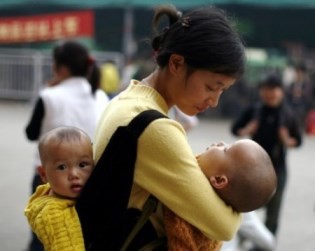As 2016 commenced, People's Daily enumerated the top 10 events that are seen to create great impact on the Chinese people.
First on the list is the implementation of the new regulation for residence permits which mandates every city to offer a basic set of public services for individuals who have lived in their area for at least six months. The regulation that took effect on Jan. 1 was issued by the State Council on Nov. 26, 2015.
Statistics show that around 170 million people have lived across administrative regions for the past six months and have contributed to their respective local economies. However, they do not enjoy the same equal rights as what the native residents do.
Second, the taking effect of the landmark two-child policy, as stated by the newly revised population and family planning law. The policy change was passed during the Oct. 26-29 Fifth Plenary Session of the 18th Communist Party of China (CPC), while the amendments on the law were passed on Dec. 27, 2015, during a session of the National People's Congress Standing Committee.
This 2016, the newly born population is expected to hit over 20 million. Around 90 million families were qualified for the new policy.
Third, the establishment of a more equitable social security system that will cover all Chinese people, may they be living in the urban or rural area. Though pilot programs were launched for the past two years, the scheme, whose key components include pension and medical care, will go onto a national scale starting this year until 2017.
Currently, the system's pension insurance aspect covers over 80 percent of the population, while the basic medical insurance services cover more than 95 percent.
Fourth, the release of the first draft of law raising the statutory retirement age. According to the Ministry of Human Resources and Social Security, they will solicit suggestions and make amendments based from those insights this year, and in 2017, the new policy will be announced.
Fifth, the establishment of the new benefits system for the country's 20 million disabled people. First issued in Sept. 2015, the system will provide an allowance (50 to 700 yuan) and subsidy for nursing the disabled (300 yuan).
Sixth, the nationwide implementation of the new air quality standard to be led by the Ministry of Environmental Protection and the General Administration of Quality Supervision, Inspection and Quarantine of China. Starting Jan. 1, the standard will set a limit for the first time on the PM2.5, PM10 and ozone concentration levels.
Seventh, the completion of the Shanghai-Kunming High-speed Rail, which is part of the grand 2,264-kilometer railway network project by the government. The project links one municipality directly under the central government and five provincial capital cities.
Eighth, the launching of a pilot program for the changes to the rules in applying for and obtaining a driver's license. The move aims to curb the cases of red tape and corruption involved in license applications and driver training. Under the new scheme, the training model of driving schools will be innovated, requiring independent decision-making capabilities.
Ninth, the full implementation of the unified immovable property registration system, which looks at cutting down on property speculation and the introduction of a property tax. According to the article, the "rules involve the registration of land, waters, forestry and real estate." An information management hub will be set up before 2018.
Lastly, the introduction of the system of ID card acceptance, loss reporting and claims at alien locations, making it easier for citizens to reapply for such cards, report its loss, and search for information in nearby police stations. The system is set to be fulfilled nationwide by July 2017.




























